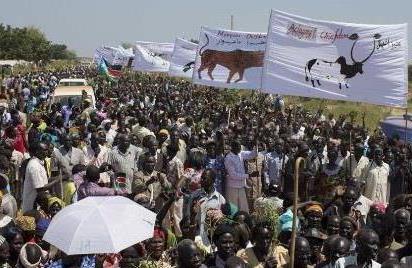Abyei community reject UN Security Council calls for joint administration
June 21, 2014 (JUBA) – Community leaders from the oil-producing region of Abyei have rejected a United Nations Security Council resolution calling for establishment of a joint administration in the disputed area.

“We, the members of the Nine Ngok Dinka chiefdoms of Abyei Area, meeting in various caucuses have agreed to unreservedly reject the move of united nations security council in its resolution 2156 (2014) in which it disregarded its resolution 1990 (2011) and 2046 (2012), the African Union High Level Implementation Panel (AUHIP) proposal on the final status of the Abyei Area, the result of the Abyei community referendum October 2013, and the recommendation of our committee high committee on April 2014, submitted to the team of the united nations which came from the headquarters in New York for strategic review of the United Nations interim force for Abyei (UNISFA)”, partly reads the statement.
The UN Security Council last month renewed the mandate of its peacekeeping mission in the Abyei border region between Sudan and South Sudan, calling for an earlier establishment of a joint administration, a legislative council and a joint police force in the area.
The Council, in its resolution, also reiterated its demand that Sudan and South Sudan immediately resume the work of their joint oversight committee on Abyei to “ensure steady progress on the implementation of the 20 June 2011 Agreement”.
But the Abyei community leaders instead urged UNISFA to stands up to its mandate and make the government of Sudan, its army with allied militia groups in the area pull out from the areas defined from the 2009 ruling of the permanent court of arbitration.
Their continued presence in the disputed oil-producing region was a clear violation of the numerous UN security council resolutions and should have been the latter’s concern, they argued.
The statement further called on the UNSC, the African Union Peace and Security Council (AUPSC), the international community and all peace loving people and human right observers to accept the outcome of an unilateral referendum held by the Ngok Dinka.
In October 2013, more than 99% of Abyei’s Ngok Dinka residents voted in favour of joining the new Republic of South Sudan, according to the results published by the committee that organised the unofficial vote.
Last year, the Dinka Ngok rejected the formation of a joint administration with the Sudanese government in the contested border region of Abyei, accusing Khartoum of having “killed the spirit of dialogue with [the] assassination of the area’s paramount chief, Kuol Deng Kuol”.
Kuol, the chief of the nine Dinka Ngok chiefdoms, was travelling in a UN convoy that had visited an area in the north of the contested oil-producing territory on 5 May when armed members of the Misseriya tribe – the Arab nomads who also lay claim to the area – attacked the convoy.
A referendum initially scheduled for January 2011 to decide the fate of the Abyei area failed to take place over disagreements between two Sudans over who was eligible to participate in the vote.
(ST)
